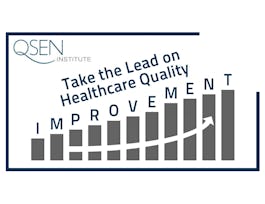In this course, you’ll learn the foundational economic theories behind health care innovation and how to optimize your own health care practice or organization. Designed to help you gain a practical understanding of the theoretical frameworks of behavioral economics and operations management in the health care setting, this course will help you apply these frameworks to assess health care practices and apply innovation while managing risk. You’ll also explore the best practices for evaluating one’s innovative practices, using real-life examples of success to see the concepts in action. By the end of this course, you’ll have honed your skills in optimizing health care operations, and be able to develop the right set of evaluations and questions to achieve best innovative practices within your organization.



Health Care Innovation
This course is part of The Business of Health Care Specialization



Instructors: Christian Terwiesch
Sponsored by InternMart, Inc
11,259 already enrolled
(291 reviews)
Skills you'll gain
Details to know

Add to your LinkedIn profile
4 assignments
See how employees at top companies are mastering in-demand skills

Build your subject-matter expertise
- Learn new concepts from industry experts
- Gain a foundational understanding of a subject or tool
- Develop job-relevant skills with hands-on projects
- Earn a shareable career certificate


Earn a career certificate
Add this credential to your LinkedIn profile, resume, or CV
Share it on social media and in your performance review

There are 4 modules in this course
This module was designed to give you a foundational knowledge of health care operations and methods of optimization. You’ll examine the provider-patient relationship and learn how a provider can improve performance measures for the patient by analyzing the different types of performance metrics such as patient-centric, operations, and financial measures. Through discussing the different types of inefficiencies such as waste, variability, and inflexibility, you’ll be able to optimize performance and service. You’ll also learn how to gauge patient flow by flow rate, flow time, and inventory, and be able to map processes using a flow diagram and a Gantt chart. By the end of this module, you’ll be better able to calculate the financial viability of a health care provider using Key Performance Indicators (KPI) and create a framework to assess and optimize performance.
What's included
9 videos1 reading1 assignment
In this module, you’ll see how techniques in innovation that originally developed outside of health care can be deployed successfully in health care systems and organizations. Using your understanding of optimizing health care operations, you’ll be able to apply innovative techniques to a more traditional ecosystem of health care. You’ll learn how innovative researchers and clinicians changed some of the more grounded approaches to health care. Through analyzing the scientific method, you’ll be able to craft a hypothesis statement of your innovative idea and identify key assumptions in your statement to test first. By the end of this module, you’ll be able to successfully assess the value and plausibility of the hypothesis of your innovation, and effectively utilize successful instances of innovation to your health care practice.
What's included
5 videos1 reading1 assignment
In this module, you’ll examine the practice of evaluation and how it is applied to health policy and programs. You’ll gain a better understanding of the need for evaluations in an ever-changing health care environment, and the importance of control groups to combat selection bias that may skew the findings of an evaluation. You’ll explore different methods to conducting an evaluation, the types of questions an evaluation aims to answer, and the difference between effectiveness and efficacy. By the end of this module, you’ll understand the theoretical framework behind an evaluation and be able to employ an evaluation to better analyze the effectiveness of your health care organization.
What's included
6 videos1 reading1 assignment
This module was designed to highlight the importance of behavioral economics in health care practice and how to utilize behavioral economic theory to optimize the operations of your health care organization. You’ll explore Expected Utility Theory and the different types of Prospect theory such as Reference Dependence, Diminished Sensitivity, and Loss Aversion in the context of health care. By studying real-life examples of Default Bias and Increased Cost Sharing case studies, you’ll establish a framework for health care interventions that will be effective and successful after implementation. By the end of this module, you’ll be better able to determine the theoretical basis for certain health care practices such as nudge units and whether such practices would benefit your organization.
What's included
7 videos1 reading1 assignment
Instructors

Offered by
Why people choose Coursera for their career




Learner reviews
291 reviews
- 5 stars
68.25%
- 4 stars
23.54%
- 3 stars
5.46%
- 2 stars
1.02%
- 1 star
1.70%
Showing 3 of 291
Reviewed on Nov 6, 2019
I found the course helpful overall, I found the 3rd module to be the most difficult and hard to follow and felt there was a lot of information without real world examples.
Reviewed on Jun 4, 2020
Week 1 and 4 are great. Week 3 is ok, Week 2 didn't add any value for me.
Reviewed on Jan 21, 2021
Very knowledgeable and interesting sessions presented by instructors who are clear and give good examples.
Recommended if you're interested in Health

Imperial College London

Johns Hopkins University

Case Western Reserve University

Open new doors with Coursera Plus
Unlimited access to 10,000+ world-class courses, hands-on projects, and job-ready certificate programs - all included in your subscription
Advance your career with an online degree
Earn a degree from world-class universities - 100% online
Join over 3,400 global companies that choose Coursera for Business
Upskill your employees to excel in the digital economy





